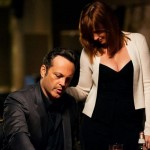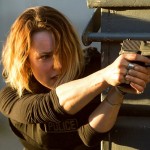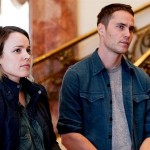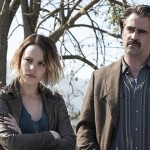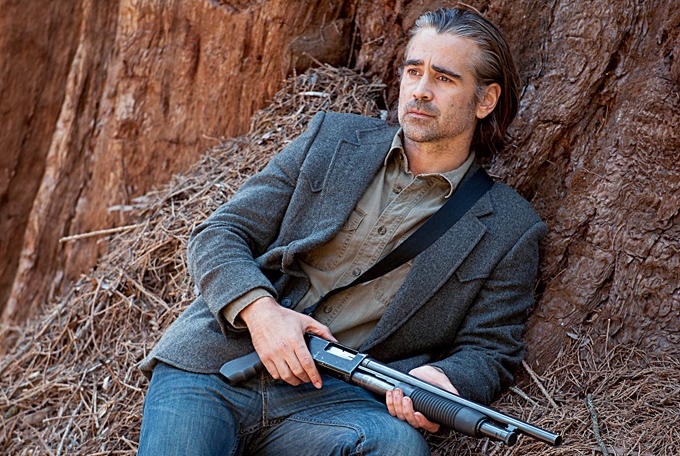
Spoilers all the way, so be warned.
I kind of expected forces beyond their control to crush Frank and Ray. Especially Ray, since that was foretold by Remo Williams. But what I didn't expect was how much becoming "your best self" would be the unifying theme that smuggles some hope out of the darkness. That was always kind of the point of True Detective, I guess. Even in the first season, Marty and Rust wind up in a surprisingly optimistic place — having reconciled their demons — even while leaving some of the guilty parties to escape unpunished. Pizzolatto casts no moral aspersions on the dark nature of his world, while giving the audience some (perhaps cold) comfort that things will be a little okay in the end.
It's no surprise that this season's finale, "Omega Station," has the monumental task of tying together a roiling cauldron of plot lines, long-hinted reveals, and the overarching themes that have guided our anti-heroes. And it turns out that "getting the world we deserve" isn't a necessarily a bad thing, even when it could have been better. There's probably a metaphor for the whole show in there somewhere.
Ray and Ani bask in the glow of their newfound love by recalling the worst decisions they ever made — with Ani realizing she willfully indulged her molester because she wanted to feel pretty, while Ray faces the fact that killing the wrong man ruined the family he was trying to save. That leads to Ray calling Woodrugh's phone and learning of his death from his killer, Burris (Agent Carter's James Frain) who is setting Ray up for the murders of Woodrugh and Davis. When Burris learns that Ray knows about the diamond heist — and pretty much everything else — he becomes amiable to negotiation.
After a perfunctory period of mourning (roughly fifteen seconds) Ray and Ani somehow deduce that the movie set photographer from episode three is the brother of Laura, Caspere's ex-secretary; known collectively as the two child survivors from the '92 diamond heist. Ani and Ray figure they're the prime suspects in Caspere's murder (don't ask how). Turns out they're right: they find Laura at a house, hand cuffed to a fireplace where her brother Len (who, it turns out, is the Birdman) left her. He's gone; out for revenge against Holloway and Burris — the diamond thieves and killers of his and Laura's parents. Though it seems that the murder of Caspere was somewhat accidental. Just an interrogation to find Burris and Holloway that got out of hand. Laura spills about everything, including the hard drive which they've had all along. It erased itself (a McGuffin with a side of fries), but it can still prove useful as a dodge since no one else knows that. Ray wants to make the criminal case with Laura's testimony and the stolen land contracts, but he needs to stop Len from killing Holloway first.
Meanwhile, Frank discovers the Mayor of Vinci, Austin Chessani, is dead, likely by his own pimp son's hand. (Remember Tony?) Frank, feeling the noose closing, puts the second half of his plan into action. Namely the raid of the secret meeting at Chessani's Lodge. The duplicitous Russian tool Osip and McCandless — the head of Catalyst — are meeting to seal the railroad deal with 12 million in cash (almost half of that being Frank's). He talks Ray into helping him take them all out (a job made easier by the Tony Montana-sized arsenal Frank has stockpiled) with the promise of splitting the money down the middle so that all of them — Frank, Ray, Ani, and Jordan — can escape to Venezuela and live out their days quaffing tequila without fear of extradition. The heist goes off without a hitch. Ray and Frank mow down a bunch of Osip's henchmen, culminating in the death of McCandless — and Frank extracting sweet revenge from a groveling Osip. They get away clean with the millions. Which should be your first clue that they are totally fucked.
I'll leave the rest to be seen rather than told, but the fact is it's almost impossible to talk about the totality of True Detective without synopsizing the shit out of it. If only to illustrate exactly how dense it is. Because, taken as a whole, that was this season's biggest problem. Bloated writing, loaded with too many characters and multi-threaded plots, some of which went nowhere. The complexity amounts to narrative hubris. As Salon's Anna Silman notes, it's convoluted to the point that writers who watch television for a living have been praising the clarity of this great breakdown by Willa Paskin over at Slate for the massively helpful, time-saving reference it is.
And the stuff that went nowhere. Christ. The biggest offender here is Woodrugh, a character who I suspected had practically no reason to exist. Spoiler: he didn't. That's made even clearer by the fate of his mother and pregnant girlfriend. Remember the end of Breaking Bad? Hule is left sitting in a safe house waiting for the all clear and we never see him again? That's Woodrugh's mom and jilted fiancee. He get's a highway named after him, though.
Pizzolatto is overcome by trying to craft deep characters within a plot that gets so out of control you'd need one of Rust Cohle's flow charts to keep up. All the information is there to be seen. But the machinations are so briefly noted and muddled amidst the thick exposition that the very thing that mystifies (the narrative complexity) ironically amounts to lazy writing. It seems like a contradiction. Whole characters are meant to fulfill narrow purposes. Stan? Dr. Piltor? (Who winds up dead here too, though I thought Ray had killed him a couple of episodes back. Who slit his wrists? Who fucking cares?) Dixon? Ani's father? The reveal of Len being Caspere's killer and the guy who shot Ray connects with all the weight of a balsa wood baseball bat. The sense of the perfunctory pervades Pizzolatto's means to an end storytelling.
But True Detective kept me hanging in there despite the suffocating tone, the lack of coherence, and the sometimes awful dialogue. At its best the show is buoyed by characters we ultimately care for — even when Pizzolatto's themes of dysfunctional fatherhood and men rising above their worst instincts turned them into archetypes (made tangible by a fine cast doing their best to give this lumpy ball of clay a practical shape). I never devolved into hate-watching, but the sheer unevenness of this season had me scoffing more often than it left me thrilled.
Pizzolatto needs a counterweight to help reign in his excesses — in this case verbosity and an over reliance on blunt force dramatics to the point of self-parody. It doesn't have to be Fukunaga, but someone strong. How about a season with directors like Friedkin or Scorsese behind the wheel? Or even just a co-writing partner. The two most digestible episodes this season were co-written by Scott Sasser. "Omega Station" gave us much of what was promised in the meandering seven hours that preceded it, but it's unevenness is a microcosm of the show as a whole. This just happened to have the weight of the end behind it, giving the proceedings an inexorable sense of gravity.
Ray and Frank go out like champs. Episode director John Crowley (who was in the chair for "Other Lives") brings an assured stylistic hand to those scenes. They're emotionally resonant and exciting. In fact, one of the best things about this episode was the mounting sense of dread and tension. We feel the the unseen forces that spell doom for two inherently good men, who share an unlikely kinship. Ray just misses his chance at salvation, during a Miller's Crossing-inspired denouement — coming to accept the inevitable and kicking as much ass as he can before being torn to shreds (just like Dad promised). Frank's equally fitting end finds him bleeding out as limps across a desert he can never escape, taunted by the ghosts of his past, and too stubborn to realize he's already dead. Which is Frank, to a tee.
And the hope? That lies with the women. Sure, the rail deal goes through. Burris gets a promotion. Tony Chessani rises in stature. The guilty have escaped judgement and even been rewarded. But Ani is the hope that the purifying light (of evidence given to a reporter) bares the truth for all to see.
And Ray's boys can swim.
Some hated it, some we're indifferent. All seemed disappointed. But, personally, I'm still looking forward to season three. See you then.

